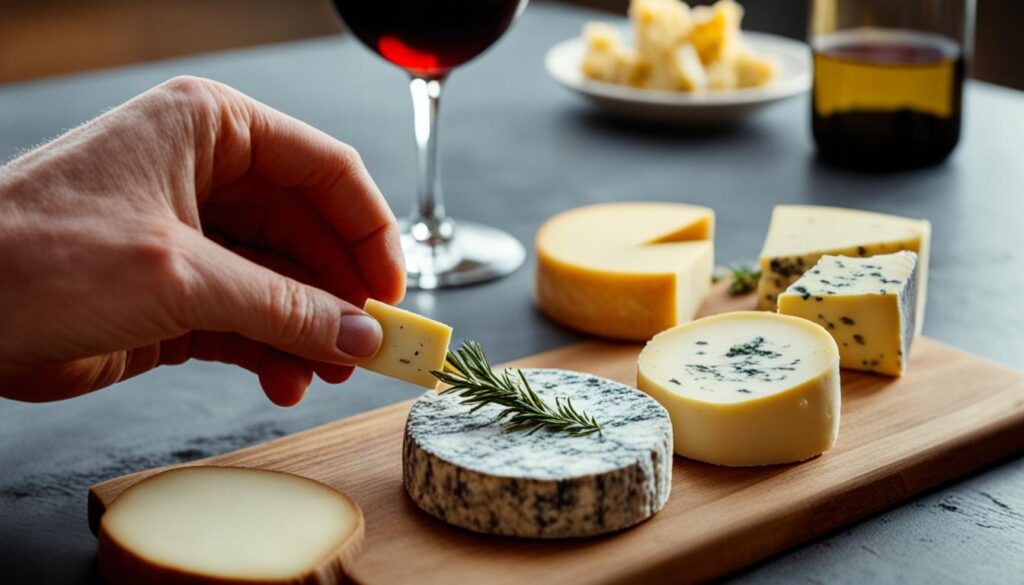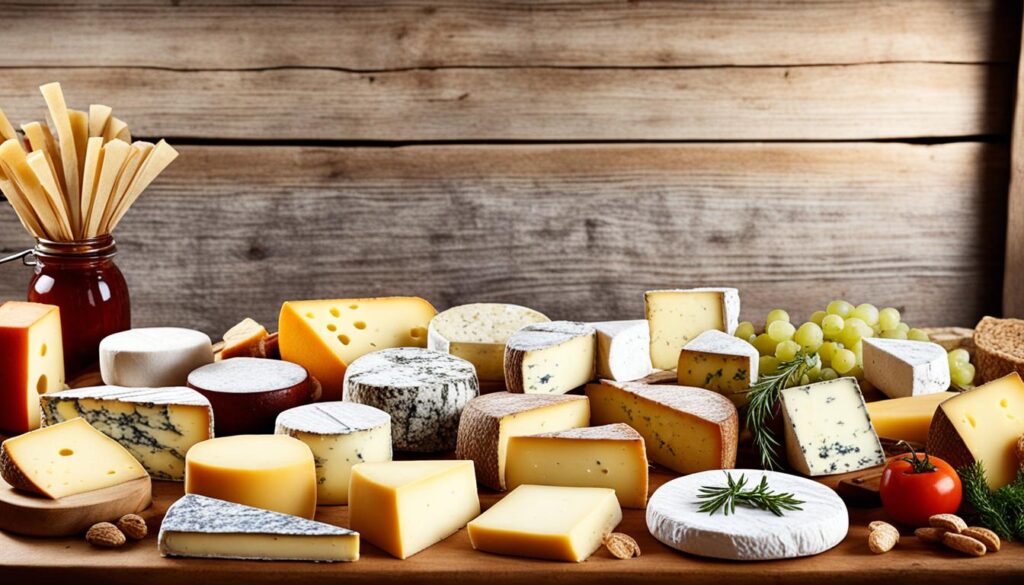Artisanal cheese tasting is a delightful journey that allows you to savor and understand the nuances of fine cheeses. Whether you’re a beginner or a seasoned cheese enthusiast, learning the essentials of cheese tasting is an invaluable skill. In this article, we will delve into the world of artisanal cheese tasting, covering everything from the basics to advanced techniques. Get ready to unlock the secrets of artisanal cheese tasting and enhance your cheese appreciation.
Key Takeaways:
- Artisanal cheese tasting is a journey of discovery and appreciation.
- Engage all your senses to fully experience the flavors, aromas, and textures of cheese.
- Learn about the five simple cheese flavors: sweet, savory, salty, bitter, and sour.
- Explore online resources and consider enrolling in cheese tasting classes to deepen your knowledge.
- Developing advanced tasting skills can benefit professionals in the culinary industry.
The Basics of Cheese Tasting
Tasting cheese is a multi-sensory experience that allows you to appreciate the rich flavors, aromas, and textures of artisanal cheeses. To fully enjoy this gastronomic journey, it’s important to understand the fundamentals of cheese tasting. By following these techniques and tips, you can elevate your cheese tasting skills and discover a whole new world of flavors.
1. Engage your senses:
Before diving into the tasting, take a moment to observe the cheese’s appearance. Notice its color, texture, and any visible mold or rind. Then, take a deep breath and inhale its aroma. This will give you a preview of the flavors you can expect.
2. Taste the five flavors:
When tasting cheese, pay attention to the five basic flavors: sweet, savory (umami), salty, bitter, and sour. Each cheese will have a unique combination of these flavors, which contribute to its overall taste profile. By identifying these flavors, you can start to understand the characteristics of different types of cheese.
3. Appreciate complex flavors:
Keep in mind that cheese tasting involves more than just the basic flavors. Complex flavors, created by a combination of taste and smell, play a significant role in the overall taste experience. Take note of any nutty, fruity, or earthy undertones, as well as any subtle hints of herbs or spices.
4. Use a structured approach:
To fully appreciate the nuances of artisanal cheese, it’s helpful to use a structured tasting approach. Start by taking a small bite and allowing the cheese to coat your tongue, paying attention to the initial taste and texture. Chew slowly to release more flavors. Take note of any changes in taste or texture as the cheese lingers in your mouth.
5. Explore cheese pairings:
Pairing cheese with complementary flavors can enhance your tasting experience. Experiment with different accompaniments like fruits, nuts, bread, and jams to find combinations that bring out the best in both the cheese and the accompanying ingredients.
“Cheese tasting is an art that engages all your senses, from the visual assessment to the rich flavors and aromas. It’s a journey of discovery and appreciation for the craftsmanship behind artisanal cheeses.” – Cheese Connoisseur Magazine

| Artisanal Cheese Flavors | Characteristics |
|---|---|
| Sweet | A pleasant, sugary taste that can range from subtle to pronounced. |
| Savory (Umami) | A rich, savory taste that adds depth and complexity to the cheese. |
| Salty | A noticeable saltiness that can vary in intensity. |
| Bitter | A slightly bitter taste that adds balance and contrast. |
| Sour | A tangy or acidic taste that provides a refreshing element. |
Cheese Tasting Classes and Resources
If you’re eager to expand your knowledge of artisanal cheese tasting, there are plenty of options available to enhance your cheese tasting skills. Consider enrolling in cheese tasting classes offered by Fromagio’s Artisan Cheese, a renowned provider of cheese education. These guided tasting classes cover a range of topics, from the basics of cheese to exploring the cheese of different countries. Led by experts in the field, these classes offer a hands-on experience that will deepen your understanding and appreciation of artisanal cheese.
In addition to in-person classes, there are also various online resources that can further enhance your cheese tasting skills from the comfort of your own home. Explore a wide range of articles, videos, and courses that delve deeper into the world of artisanal cheese. These resources provide valuable insights into cheese tasting techniques, flavor profiles, and the history of different cheeses. Whether you prefer a structured class or self-guided learning, there is something for everyone to take their cheese tasting experience to the next level.
Organized Cheese Tasting Parties
If you’re looking for a unique and enjoyable way to enhance your cheese tasting experience, consider hosting a cheese tasting party. Gather your friends, family, or fellow cheese enthusiasts for an interactive and delicious event. Create a curated selection of artisanal cheeses from different regions, each with its own unique flavors and characteristics. Enhance the tasting experience by pairing the cheeses with complementary accompaniments such as crackers, fruits, or honey. Encourage your guests to share their impressions and opinions, fostering engaging conversations and the discovery of new cheese favorites.
Hosting a cheese tasting party is not only a fun and social way to explore and appreciate artisanal cheese, but it also provides an opportunity to learn from one another’s perspectives and taste preferences. Share your knowledge and passion for cheese while creating lasting memories with those who appreciate the art of cheese tasting.

Artisanal Cheese Tasting Resources
| Resource | Description |
|---|---|
| Fromagio’s Artisan Cheese | A provider of guided cheese tasting classes covering a variety of topics, led by cheese experts. |
| Cheese Education | An online platform offering courses, articles, and videos on cheese tasting and education. |
| Cheese Connoisseur Magazine | A publication that features articles, interviews, and reviews focused on artisanal cheese and its tasting experience. |
| Online Cheese Retailers | Websites that sell a wide selection of artisanal cheeses, often accompanied by tasting notes and recommendations. |
| Cheese Tasting Books | A selection of books written by cheese experts, providing in-depth knowledge and guidance on cheese tasting. |
The Role of Cheesemakers and Affineurs
Cheesemakers and affineurs play a crucial role in creating the taste and flavor profiles of artisanal cheese. Through the cheesemaking process, enzymes and bacteria metabolize milk solids, resulting in unique flavors. Skilled cheesemakers can balance and combine different flavors to create a harmonious cheese. Understanding the different types of taste and flavor combinations is essential for cheesemakers and affineurs to create exceptional cheeses that meet the preferences of their customers. By harnessing their expertise, they can shape and refine the flavors that make each cheese special.
| Cheesemakers | Affineurs |
|---|---|
| Cheesemakers focus on the initial production of cheese, from milk selection and preparation to the cheese aging process. | Affineurs specialize in aging, maturing, and refining cheeses to enhance their flavor and texture. |
| They employ various techniques, including the addition of specific cultures, controlling temperature and humidity, and using unique aging environments like caves. | Affineurs carefully monitor and ripen cheeses to achieve the desired flavors and textures, ensuring they reach their peak condition for consumption. |
| Cheesemakers create the foundation of a cheese’s flavor through the selection of milk, starter cultures, and the cheese’s aging process. | Affineurs refine and enhance the flavors developed by cheesemakers, bringing out the complexity and subtleties of each cheese. |
Together, cheesemakers and affineurs collaborate to produce exceptional artisanal cheeses that delight cheese enthusiasts worldwide. Their expertise and dedication to the craft are essential in ensuring the creation of cheeses with an exquisite taste and flavor that captivate the palate.
“Cheesemakers and affineurs are artisans who work tirelessly to create cheeses that are not just delicious but also distinct and memorable.” – Jean-Paul Martin, Master Cheese Affineur
Purchasing and Describing Cheese
When it comes to purchasing cheese, having a clear idea of the style and flavor profile you prefer is essential. With a plethora of options available, making informed choices will ensure you select cheeses that truly tantalize your taste buds. A systematic approach to tasting, recording your preferences, and expanding your knowledge of different cheeses will aid in making wise decisions. Additionally, being able to accurately describe the taste of cheese using appropriate vocabulary, such as lactic or buttery, can help you communicate your preferences and provide recommendations to others.
To ensure you choose the perfect cheese, follow these steps:
- Start by determining the style of cheese you enjoy. Are you more inclined towards soft cheeses like Brie or creamy blues like Roquefort?
- Consider the basic flavor profile you desire. Do you prefer mild and delicate flavors or robust and pungent ones?
- Next, explore specific flavor characteristics. Are you partial to nutty and earthy flavors or tangy and sharp notes?
By understanding your preferences and developing your palate, you can confidently navigate the world of cheese and make purchases that will truly satisfy. Remember, exploring different types of cheese and flavors will allow you to discover new favorites and broaden your cheese knowledge.
Describing the Taste of Cheese
Accurately describing the taste of cheese is an art that enhances your appreciation for this culinary delight. Use the following vocabulary to effectively communicate the flavors you experience:
- Lactic: This term describes the taste of fresh milk or yogurt, reflecting a creamy and tangy flavor.
- Nutty: This refers to the taste of nuts, such as almonds or hazelnuts, which adds a rich and savory element to the cheese.
- Buttery: This indicates a smooth and creamy taste, similar to the richness of butter.
- Sharp: Sharpness refers to a strong, tangy, and sometimes acidic flavor that lingers on the palate.
- Caramelized: This term describes a cheese with a sweet and rich flavor that is reminiscent of caramel.
By using descriptive words like these, you can better communicate your preferences and guide others in their cheese selection. Whether you’re purchasing cheese for yourself or recommending it to others, accurate descriptions are key to creating a memorable and enjoyable cheese experience.
| Cheese Style | Flavor Profile | Examples |
|---|---|---|
| Fresh | Lactic, Mild | Feta, Chèvre |
| Soft | Creamy, Delicate | Brie, Camembert |
| Hard | Nutty, Aged | Cheddar, Gouda |
| Blue | Sharp, Tangy | Roquefort, Stilton |
| Washed Rind | Savory, Pungent | Epoisses, Taleggio |
Use this table as a guide to understand the flavor profiles of different cheese styles. Each cheese style offers unique taste experiences, allowing you to explore a diverse range of flavors and textures.
Cheese Tasting for Cheese Mongers, Chefs, and Sommeliers
For professionals in the culinary industry, having a deep understanding of taste and flavor is essential. Cheese mongers, chefs, and sommeliers can benefit from honing their tasting skills to provide expert advice to customers and create exciting flavor combinations. By exploring complex flavors, identifying different levels of acidity or bitterness, and understanding mouthfeel, these professionals can curate menus, recommend wine pairings, and enhance the overall dining experience. Developing advanced flavor skills can give them a competitive edge in their respective fields.
When it comes to cheese, cheese mongers need to have a discerning palate to select the finest artisanal cheeses for their customers. They must be knowledgeable about different types of cheese, from soft and creamy to aged and sharp, and understand the variations in taste, texture, and aroma. By continuously refining their tasting skills, cheese mongers can confidently guide customers in choosing the perfect cheese for their preferences and occasions.
Meanwhile, chefs rely on their ability to taste and identify flavors to create harmonious and innovative dishes. By understanding the taste profiles of different cheeses, chefs can incorporate them into their recipes and pair them with complementary ingredients. A well-executed cheese pairing can elevate a dish to new heights, pleasing the palates of diners and leaving a lasting impression. Chefs who have honed their cheese tasting skills have an advantage in designing menus that highlight the richness and diversity of artisanal cheeses.
Sommeliers, on the other hand, are masters of pairing wine with food, and cheese is no exception. With their expertise in taste, aroma, and texture, sommeliers can select the perfect wine to enhance the flavors of cheese. The right wine can either complement or contrast the taste of cheese, creating a delightful sensory experience. By developing their tasting skills, sommeliers can confidently make recommendations to patrons, ensuring a harmonious pairing that enhances both the cheese and the wine.
Overall, cheese tasting is a valuable skill for professionals in the culinary industry. By continuously refining their taste and flavor perception, cheese mongers, chefs, and sommeliers can provide expert guidance, create exciting combinations, and elevate the overall dining experience. Their dedication to mastering the art of cheese tasting sets them apart and establishes their reputation as trusted experts in the world of artisanal cheese.
Conclusion
Embark on a journey of discovery and appreciation with artisanal cheese tasting. By understanding the basics of cheese tasting, exploring different flavors, and learning from experts, you can unlock the secrets to savoring and understanding fine cheeses like a pro. Whether you’re a beginner or an experienced cheese enthusiast, the knowledge and skills gained from cheese tasting will enhance your enjoyment of artisanal cheeses.
The essentials of cheese tasting provide a structured approach to engage all your senses and appreciate the intricacies of each bite. From understanding the five simple cheese flavors to appreciating complex taste profiles, you’ll develop a discerning palate that allows you to distinguish different types of cheese.
To further elevate your cheese tasting experience, consider enrolling in cheese tasting classes or exploring online resources. Fromagio’s Artisan Cheese offers guided tasting classes that cover a range of topics, providing a hands-on experience led by experts in the field. Additionally, online articles, videos, and courses can deepen your knowledge and enhance your cheese tasting skills.
So, are you ready to embark on this delicious adventure? With your newfound knowledge and skills, you’ll be able to appreciate and savor fine cheeses in a whole new way. Take the first step today and elevate your cheese tasting experience to new heights.
















